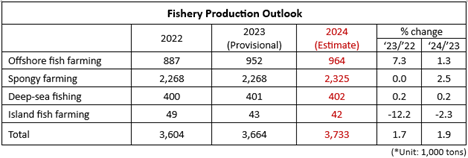
Market Information > Food News Clipping
Food News Clipping
January 4 - 17, 2024
2024.01.22
FAS/Seoul Monitoring of Media Reporting on Agricultural Issues
Today's Date: Monday, January 22, 2024
For Coverage: January 4 ~ 17, 2024
Japan
Retakes the No. 1 Beer Exporter to Korea Last Year
https://www.khan.co.kr/economy/economy-general/article/202401170741001
Summary: In 2023, Japan reclaimed the position of the number one beer
exporter to Korea for the first time in five years. According to Korea
Customs Service trade data on the 17th, imports of Japanese beer
soared 283.3% year-on-year to $55.5 million last year. On the other hand,
Chinese beer exports, which ranked first in 2022, declined by 17.2% to $30.2
million compared to the previous year. The top five beer exporters to
Korea last year were Japan ($55.5 million), the Netherlands ($33.6 million),
China ($30.2 million), the United States ($16.9 million) and Poland ($13.7
million). On the contrary, the largest importers of Korean beer in 2023
were Hong Kong ($29.5 million), Japan ($13.9 million), the United States ($8.8
million), Mongolia ($8.7 million) and China ($3.2 million).
Total Fishery Production in 2024 is Expected to Increase by 2 Percent to
3.73 Million Tons
http://www.foodnews.co.kr/news/articleView.html?idxno=106337
Summary: The Korea Maritime Institute (KMI) held the ‘2024 Maritime and
Fisheries Outlook Conference’ in Seoul on January 11th. At the
conference, the total fishery production in 2024 is expected to reach 3.73
million tons, a 2% increase from the previous year. Director Kim Soo-Hyun
in the KMI Fisheries Observation Center said that total seafood exports in 2024
is estimated to $3.09 billion, a 3% increase from the previous year due to
increased exports through the decline in producer prices and the continued
increase in seaweed exports, and total imports is estimated at $6.74 billion, a
6% increase due to the increase in consumption of main consumer-preferred
fishery products such as fish, shellfish, crustacean, and squid. The
total self-sufficiency rate for fishery products is expected to drop from 74.1%
in 2023 to 73% this year (53.7% for fish, 49.9% for shellfish, and 129.2% for
seaweed). Meanwhile, the fishing population in Korea has been decreasing
from 90,804 people (42,536 households) in 2022 to 85,839 people (41,057
household) in 2023 and 83,321 people (40,335 households) in 2024.

(Table: Fishery
production outlook by fishing types)
Slaughtering
a Dog for Food is Punishable by Up To 3 Years in Prison… Special Law Passed by
Korean National Assembly
http://www.foodnews.co.kr/news/articleView.html?idxno=106285
Summary: A special law on ending the breeding, slaughter, and
distribution of dogs for food was passed by the National Assembly in Korea on
January 9th. Once the special act on dogs for food enters into
effect, the operation of new or additional breeding farms and slaughter,
distribution, and sales facilities for dogs for food is prohibited
immediately. Those facilities must report their operation status to the
local government within 3 months after the promulgation. Additionally,
implementation plans to terminate their operation must be submitted within 6
months. Under the enactment of the special act on dogs for food, the breeding,
slaughter, distribution, and sales of dogs for the purpose of eating is
prohibited, as in the United States and Taiwan, from 2027 after a three-year
grace period. In case of slaughter, imprisonment for up to 3 years or a
fine of up to 30 million KRW ($23,000) is imposed. In the event of
breeding, propagation, distribution, and sales, imprisonment for up to 2 years
or a fine of up to 20 million KRW ($15,000) is charged.
Seafood
Exports Decreased to $3.004 Billion Last Year… Seaweed, Tuna, and Oyster
Leading Exports
http://www.foodnews.co.kr/news/articleView.html?idxno=106267
Summary: The amount of total seafood exports in 2023 was $3.004 billion,
a $146 million decrease from $3.15 billion the previous year. Seaweed,
which ranks number one in global market share, is estimated to have achieved a
total export result of $790 million in the past year. Tuna, the main
product of deep-sea fishing, is exported in the form of raw materials to Japan,
Thailand, etc., reached $560 million in exports. Oysters, which has
recently been gaining recognition overseas, are exported to Japan, the United
States, etc., with a 2023 export value of $86 million, an 8% increase from the
previous year. Minister of Oceans and Fisheries Kang said, despite
difficult export conditions such as a decline in global demand, they were able
to achieve $3 billion in exports thanks to the continuous efforts of the entire
fishing industry.
Korea
Sets $700 Billion Exports Goal for 2024
https://www.koreatimes.co.kr/www/biz/2024/01/126_366344.html
Summary:
On Thursday, January 4th, the Korean government announced its 2024
economic policy directions. According to these directions, Korea aims to
push for $700 billion in exports in 2024, will spend nearly 11 trillion won
($8.39 billion) to try to bring inflation down to under 3% in the first half of
the year, and bolster support for foreign investors, tourists, and manual
laborers. Overall, the Korean government expects to achieve higher grown
in 2024 compared to other developed economies due to a recovery of exports.
The policies are established under four pillars: stabilizing the people’s
livelihood, managing potential risks, activating a dynamic economy, and
devising measures for future generations.
Proportion
of Single-Person Households Jumps to 42% Last Year
https://www.koreatimes.co.kr/www/nation/2024/01/113_366297.html
Summary:
According to data from the Korean Ministry of the Interior, the number of
single-person households in 2023 jumped to an all time high of 42% of all
households. According to the ministry, the number of two and three-person
households both grew slightly while the number of four and five-person
households decreased. A ministry official noted that there is an increase
in unmarried people, and seniors, living along, which has contributed to the
increased percentage of single-person households.
Agricultural Trade Office, U.S. Embassy - Seoul
Tel: 82-2-6951-6848 Fax: 82-2-720-7921
Email: atoseoul@state.gov